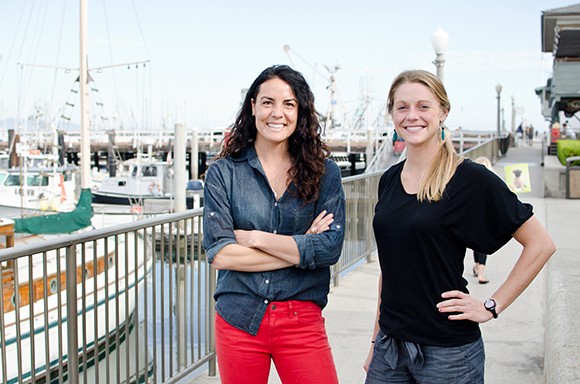Angling for change: Bren School startup serves up new model for sustainable seafood
IN THIS ARTICLE
- Agribusiness Topic
- Stephen Nellis Author
By Stephen Nellis Friday, March 14th, 2014

Norah Eddy, left, and Laura Johnson are founders of Salty Girl Seafood. The startup, spun out of the UC Santa Barbara Bren School of Environmental Science and Management, aims to make it easier for restaurants to source seafood directly from fishermen. (Alex Drysdale / Business Times photo)
If you order fish at a restaurant, how sure are you that the grouper you ordered isn’t actually a much cheaper filet of factory-farmed tilapia?
Unless you dine with a DNA test kit, you can’t be sure. Nationwide, about a third of seafood is mislabeled in restaurants, according to the nonprofit group Oceana, and the rate is 52 percent in Southern California. So chances are what you’re eating is not what you paid for.
A team of graduate students UC Santa Barbara Bren School of Environmental Science and Management is hoping to change that with a startup called Salty Girl Seafood. The core idea is pretty simple: create an online marketplace where restaurants and fishermen can connect directly to buy sustainable, traceable seafood. “We source directly from fishermen and then sell directly to chefs,” said co-founder Norah Eddy.
As it stands today, most restaurants find themselves at opposite ends of a spectrum. In coastal cities, high-end restaurants can send a chef directly to a fish market to buy off the boats. Restaurants farther from the sea or with smaller staffs are often at the mercy of large seafood distributors, as are most grocery chains.
“Not every restaurant can afford to hand-select their seafood,” said co-founder Laura Johnson. “Our model is to take the fish market to them.”
The Salty Girl model involves working with fishermen and DNA testing fish to ensure that customers get what they pay for. It uses a FedEx service called PeriShip to help handle logistics.
So far, the team has interviewed about 60 seafood buyers, mostly chefs and grocery stores. “A lot of them have had trouble obtaining sustainable seafood or really getting any kind of information on their seafood,” Johnson said.
But they are hungry for that information, Eddy said. The rampant mislabeling in the industry is thought to happen very early in the supply chain, before chefs ever get their hands on the product. Chefs want to know what they’re working with, and restaurant owners increasingly want to share that information with their customers as part of a broader farm-to-table movement. Salty Girl is planning to provide a variety of marketing materials such as QR codes for chefs and servers to push the information it collects and verifies out to the final customer — the diner.
“We know chefs are looking for information on seafood. One of the biggest trends in the the agriculture industry is to help chefs share the story of the food with the consumer,” Eddy said.
But the foundation of the system will be its work with fishermen, and Salty Girl is hoping to provide a tangible benefit to them as well. By connecting boats directly with restaurants and letting them communicate directly with consumers, Salty Girl is hoping that fisherman can see some financial gain from their sustainability efforts. “The idea when cutting out the middle man is that we’ll be able to incentivize them with higher prices than the distributors,” Eddy said. “A lot of boats are trying to do direct marketing now. We facilitate that.”
Salty Girl will have competition, but other efforts thus far have been centered mostly on domestic fishermen on the East Coast. The company is hoping to focus on California and international markets.
In particular, the founders have worked with non-governmental organizations in various countries, such as Conservation International. Those groups have been working to make small-scale fisheries in places like Central and South America more sustainable for both the environment and the fishermen. The non-governmental organizations have deep contacts with fishermen but need markets for those fishermen to sell into to make them financially viable.
A director at Conservation International approached the Salty Girl team asking about a service exactly like the one they were working on. “We thought he was joking — he hadn’t even heard of our business yet,” Johnson said.
Another benefit Salty Girl is hoping to provide to fishermen is a way to communicate incremental progress. Major sustainability labels can boost the market price of seafood, but the incremental steps toward reaching those requirements are often costly and don’t pay off until the full label is granted.
“It doesn’t acknowledge any movement toward sustainability,” Eddy said. “A service like ours is a way to fulfill that goal of marketing a value-added product.”
Salty Girl plans to launch a pilot project in April and then look toward fundraising. Both Eddy and Johnson have biology or marine biology degrees and have spent most of their lives around fish. They have both worked as observers on fishing boats in Alaska, among other adventures. They are hoping that by solving a business problem for chefs and fishermen, they can also make seafood more sustainable in the long run.
“I was really looking to mix science and business,” Johnson said. “Even though I have a technical degree, it’s hard to get people to care about it until they have a financial reason to.”










